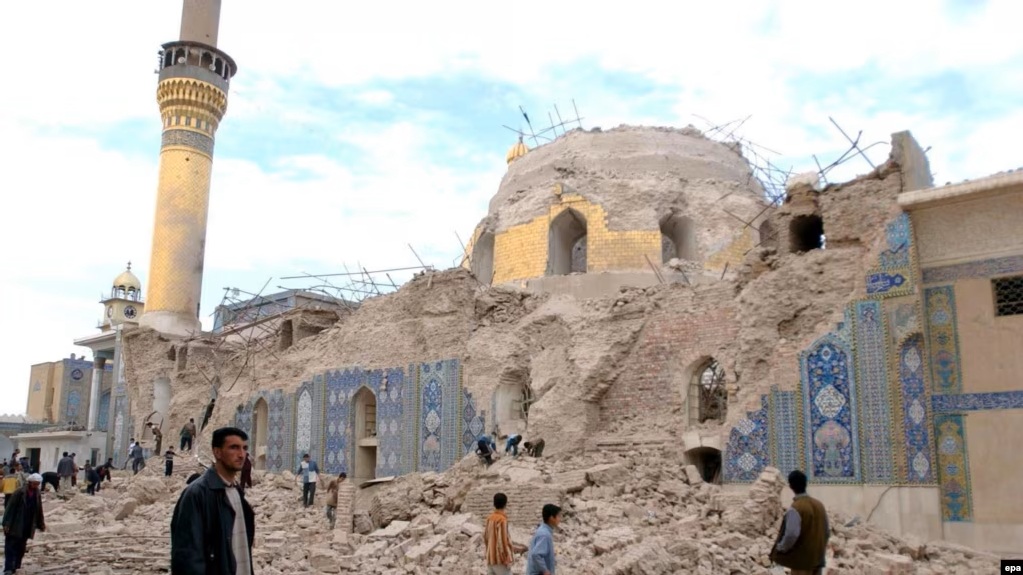
The 2006 bombing of the al-Askari shrine in Samarra by an unidentified party ignited a brutal sectarian war in Iraq. It unleashed waves of retaliatory violence that permanently altered the country’s social fabric. Baghdad, once a city of mixed communities, became almost entirely Shiite as sectarian lines hardened.
By Rafic Taleb
Understanding the historical context of Iraq is crucial. Historically, Iraq was a Sunni-majority state. Yet in the early 20th century, Britain actively encouraged Shiite migration from Iran and India into Iraq.
The aim was not demographic growth for its own sake, but rather the strategic creation of a religious buffer between French-controlled Syria and British-controlled Iraq. This policy sowed the early seeds of division that would eventually grow into larger regional rifts.
Fast forward a century: in September 2011, U.S. forces under President Obama withdrew to Kurdistan, treating the region as quasi-independent territory. This move was tacitly supported by a non-binding 2007 U.S. congressional resolution proposing Iraq’s partition into three states.
The Kurdish leadership seized on that precedent to justify its independence referendum. However, the plan was shelved as the “New Middle East” project, a geopolitical initiative aimed at reshaping the region's political and economic landscape, remained unfinished.
The consequences of that delay were devastating for the Kurds. Having liberated large swaths of land from ISIS—including the Nineveh Plain, Khanaqin, Mandali up to the Hamrin Mountains, and Kirkuk—they soon lost them.
Britain at the time gave Qassem Soleimani the green light to retake these areas, which in turn pressured Grand Ayatollah Ali al-Sistani into issuing the fatwa that created the Popular Mobilisation Forces. These militias crushed ISIS, but at the cost of Kurdish territorial claims.
The most recent U.S. pullback, this time toward the eastern Euphrates, risks repeating the cycle. Analysts warn that ISIS is likely to resurface, nourished by foreign al-Qaeda remnants still operating in Syria. In parallel, Iran-backed Shiite militias are poised to expand their power, preparing for a proxy confrontation with ISIS that could stall the ambitious Development Road project—an economic corridor designed to connect the Gulf to Turkey through Iraqi territory, and a key element of the 'New Middle East' project.
Israel, for its part, staunchly opposes this Turkish corridor. Instead, it favours the alternative Indian-Mediterranean Economic Corridor (IMEC) passing through Haifa. For this reason, Israel is expected to work closely with Washington and the broader coalition to destabilise Iraq and obstruct the Development Road.
Turkey, meanwhile, has entrenched itself militarily in Iraq with 51 bases established under agreements with Baghdad. Before 2014, Ankara had prepared—at Western urging—to seize Iraqi territory in the event of a major Iranian confrontation. Yet Israel’s careful efforts to defuse tensions with Iran and delay action against Shiite militias were designed to block Turkey from asserting dominance along the Iraqi-Syrian frontier.
Amid these manoeuvres, Washington is preparing to open the largest U.S. consulate in the Middle East in Erbil. This facility is set to become the second strategic command hub of the “New Middle East,” after Tel Aviv, supplanting Ankara. The decision to elevate Erbil was made as early as 2014.
Beyond geopolitics, the broader project envisions sweeping demographic transformations across the region, a key aspect of the 'New Middle East' project. In Iraq, a looming confrontation between ISIS and the Popular Mobilisation
Forces would likely formalise a sectarian division between Sunni and Shiite regions. In Syria, the al-Sharaà’s government has already begun the quiet displacement of minorities from Damascus, pushing forward a process of engineered demographic upheaval.
Al-Sharaa’s visits to Homs, Hama, and Idlib must be seen in this context: they were attempts to promote the idea of a northern Sunni enclave to his supporters. Analysts believe the emerging coastal region will extend deep into the western countryside of Homs and Hama, potentially linking to Iraq from the south.
At the same time, the Druze region in Suwayda may abut this coastal enclave, while the East Euphrates region stretches toward the northeastern countryside of Hama. Collectively, these borders are designed to isolate Sunni communities, severing their last remaining ties to Iraq.
The projected sectarian war in Iraq, expected within two years, is calculated to confine Sunnis to fragmented pockets—Ramadi, parts of Mosul, Salah al-Din, and Diyala—leaving the remainder of the country under Shiite control. This potential for future sectarian conflict is a cause for concern about the stability of the region.
For Western powers, particularly the United States, a unified Iraq is not desirable. A fragmented Iraq better serves the strategy of controlling trade routes and containing China’s growing economic influence. A divided Iraq, in other words, is not a byproduct of chaos but the blueprint of a carefully managed order. Understanding these strategic interests is crucial to grasping the broader geopolitical implications.





